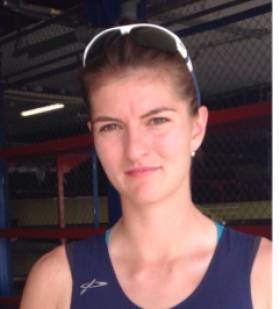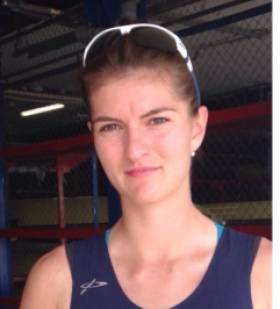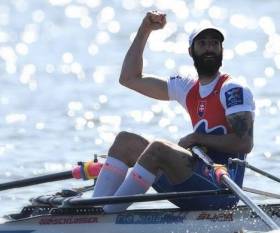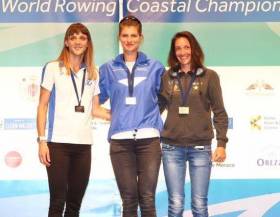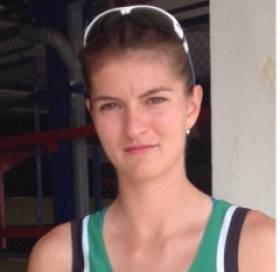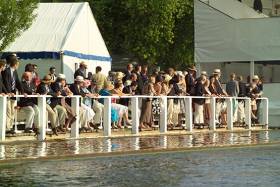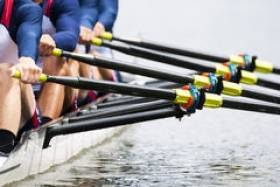Displaying items by tag: Dukarska
Ireland Lightweight Pair Continue Winning Ways
#Rowing: Mark O’Donovan and Shane O’Driscoll won their test race of the lightweight pair at the World Cup Regatta in Poznan, Poland this morning. Britain tested them through three-quarters of the race, but held off when it was clear they would again have to give way to the men in green.
Sanita Puspure and Monika Dukarska finished third and fourth in their heat and missed out on direct qualification in the heats of the women’s single sculls. New Zealand’s Hannah Osborne won a battle with Puspure to take second behind the dominant Vicky Thornley of Britain.
The Ireland pair of Aifric Keogh and Aileen Crowley took fourth in their heat.
#Rowing: Monika Dukarksa of Killorglin won the women’s Championships Single at Metropolitan Regatta at Dorney Lake today. Ronan Byrne finished third in the men’s Championship singles final and teamed up with Dan Begley to take second in the men’s Championship Doubles. Myles Taylor of Queen’s took second in the lightweight single.
Cork finished second in the women’s Championship Pairs and the Ireland men’s lightweight quadruple were third in the Championship Quadruple.
In the men's Championship Coxed Four, NUIG placed second and Trinity third.
Commercial Top Crew at Metro Regatta
#Rowing: Commercial won the men’s senior eights at the Metropolitan Regatta at Blessington today. The champions of Ireland had eight seconds to spare over UCD’s senior eight. Killorglin’s Monika Dukarska, who will also compete at London Metropolitan Regatta, won the women’s single sculls with a big margin to spare.
Metropolitan Regatta, Blessington Lakes, Saturday
Men
Eight – Division One – A Final: 1 Commercial (sen) 5:44.371; 3 UCD (intermediate) 5:57.184; 5 Neptune (junior 18A) 6:12.357. Div Two – A Final: Neptune (club two) 5:32.007; 3 UCD (nov) 5:50.023; 5 Blackrock (jun 18B) 6:27.915. Masters – A Final: St Michael’s C.
Four – Div One – A Final: Commercial (sen) 5:28.2o7.
Four, coxed – Div One – A Final: UCD (sen) 5:52.904; 2 Commercial (inter) 6:00.904; 3 St Michael’s (club one) 6:04.576; 4 Methodist (jun 18A) 6:07.373. Div Two, coxed – A Final: Methodist (jun 18B) 7:02.318; 2 Univ of Limerick (club two) 7:14.084. Masters, coxed – A Final: Galway (d)
Pair – Div One – A Final: Castleconnell (sen) 7:01.158, 2 Three Castles (jun 18A) 7:02.83; 3 Portadown (Club One) 7:03.236. B Final: Offaly (inter) 7:19.0. Div Two: Commercial (sen) 6:15.667; 5 Neptune (inter) 6:34.371; 6 Clonmel (club one) 6:43.012.
Sculling, Quadruple – Div One – A Final: Three Castles (jun 18A) 6:32.051. Div Two, coxed: Castleconnell (jun 16) 7:00.976; 2 Carlow (jun 18B) 7:04.32; 3 Shandon (club two) 7:04.913. B Final: Neptune (nov) 7:58.889.
Double – Div Two – A Final: Three Castles (jun 16) 7:09.056; 2 Carlow (jun 18B) 7:18.963; 4 Shandon (club two) 7:37.214.
Single – Div One – A Final: Castleconnell (F Crowley; sen) 6:43.47; 2 Carlow (J Keating; jun 18A) 6:49.642; 3 Castleconnell (S Haugh; inter) 6:52.799. C Final: 6 Clonmel (O McGrath; club one) 7:11.017.
Div Two: Carlow (A O’Toole; Jun 18B) 6:52.709; 3 Cappoquin (S Landers; Club Two) 6:56.991; 4 Castleconnell (R O’Neill; jun 16) 7:04.710. Masters – A Final: Carlow (N O’Brien).
Women
Eight – Div One – A Final: Commercial (sen) 6:05.32; 2 Commercial (jun 18A) 6:28.524. Div Two – A Final: Shandon (club two) 7:33.916; 2 St Michael’s (jun 16) 7:41.478; 3 Neptune (nov) 7:52.245.
Four – A Final: 1 UCD B (sen) 7:33.677; 4 Commercial (jun 18A) 7:55.24. Div One, coxed: Shandon (Club One) 7:28.331; 3 Commercial (inter) 7:40.237. Div Two, coxed– A Final: UCD (Club Two) 7:07.281.
Pair – Div One – A Final: UCD A (sen) 8:26.503; 4 UCD (inter) 8:54.035; 5 Lee (jun 18A) 8:55.394. B Final: 2 Commercial (club one) 9:33.839.
Sculling, Quadruple – Div One: New Ross (jun 18A) 6:44.305. Div Two, coxed - A Final: Lee (club two) 6:56.124, 2 Castleconnell (jun 16) 6:59.39; 5 Commercial (nov) 7:27.266. B Final: 2 Graiguenamanagh (jun 18B) 7:34.306.
Double – Div One – A Final: Neptune (inter) 6:57.084, 2 Carlow (Club one) 6:58.85. Div Two – A Final: New Ross A (jun 18B) 7:10.012; 3 Garda (club two) 7:36.044; 4 Neptune (jun 16) 7:36.7.
Single – Div One – A Final: Killorglin (M Dukarska; sen) 8:52.378; 2 Carlow (A Byrne; inter) 9:37.974; 3 Carlow (C Nolan; jun 18A) 9:43.755.
Div Two – A Final: Neptune (E Power; club two) 9:48.198; 2 Castleconnell (L O’Brien; jun 16) 9:51.167.
– Masters – A Final: Graiguenamanagh (M Cummins).
Babac and Dukarska Top Rowers of Dirty Dozen
#Rowing: Lukas Babac won the Dirty Dozen Challenge run by Castleconnell Boat Club, with Declan O’Connor of St Michael’s second. The Slovakian was a bronze medallist in the lightweight single sculls at the World Championships this year. Monika Dukarska of Killorglin was the top woman sculler, with Ruth Kilkenny of Castleconnell second. The final was run over six kilometres. Jim Quinlan and Clara O’Brien of Castleconnell won the junior 18 competition.
World Gold Medallist Dukarska is Rower of the Month
#Rowing: Monika Dukarska is the Afloat Rower of the Month for October. The Killorglin woman became the world champion in the solo (single) at the Fisa World Coastal Rowing Championships in Monaco. She won the final by 26 seconds, leaving the Olympic medallist from London 2012, Alexandra Tsiavou of Greece, in her wake. Tsiavou had won her own battle with Edwig Alfred, the champion of France.
Dukarska, who is 26, won this title first in 2009 while still a teenager.
Rower of the Month awards: The judging panel is made up of Liam Gorman, rowing correspondent of The Irish Times, and David O'Brien, editor of Afloat magazine. Monthly awards for achievements during the year will appear on afloat.ie and the overall national award will be presented to the person or crew who, in the judges' opinion, achieved the most notable results in, or made the most significant contribution to rowing during 2016. Keep a monthly eye on progress and watch our 2016 champions list grow.
Dukarska is World Coastal Rowing Champion
#Rowing: Monika Dukarska took her second World title today. The Killorglin oarswoman won the women’s solo final at the World Coastal Rowing Championships in Monaco. She had over 26 seconds to spare over Greek international Alexandra Tsiavou (31) who finished second. Tsiavou took bronze in the lightweight double sculls at the Olympic Games in 2012.
Dukarska won this title for the first time in 2009 when the Championships were held in Britain. Earlier this year she took bronze at the World University Championships in the women's single sculls.
World Coastal Rowing Championships, Monaco, Day Two
(Irish interest; selected results)
Men
Quadruple – B Final: 10 Galley Flash 18:09.04. Solo – B Final: 7 B Hooper 20:32.86; 18 D Hussey 23:11.12.
Women
Solo – A Final: 1 M Dukarska 30:57.06, 2 A Tsiavou 31:23.35, 3 O Alfred 31:29.00. B Final: 3 J Lee 22:52.54, 4 S Healy 22:53.30.
Killorglin's Dukarska Wins Heat at World Coastal Rowing
#Rowing: Monika Dukarska won her heat and qualified for the A Final of the women’s solo (single) at the World Coastal Rowing Championships in Monaco today. The Killorglin Rowing Club competitor had 11 seconds to spare over second-placed Benedetta Bellio of Italy. Dukarska won this event in 2009. Jessica Lee of Arklow finished 12th in her heat and is set to compete in the B Final.
Barry Hooper of Galley Flash and David Hussey of Portmagee will compete in the B Final of the men’s solo. Hooper was 8th in his heat where the top seven took A Final places. Hussey finished 13th in his heat. Cormac Kelly of Arklow finished 17th and missed out on a B Final place. John Casey of Arklow, who was 16th in his heat, suffered a similar fate.
The Arklow Rowing Club double missed out by one place on qualifying for their B Final, finishing 14th in their heat. Courtmacsherry finished 20th and also missed out. The Courtmacsherry coxed quadruple finished 15th in their heat and also did not progress.
Dukarska Second in Heat at World University Rowing
#Rowing: Monika Dukarksa placed second in her heat at the World University Rowing Championships in Poznan in Poland today. The Killorglin woman was four seconds behind Lisa Farthofer of Austria in her race. Just one competitor travelled on to the A Finals and the Austrian took this place. Other Ireland crews are also bound for repechages after the first set of heats.
Irish Hopes Extinguished as Dukarska Exits Henley
#Rowing: Ireland’s last crew at Henley Royal Regatta exited this morning. Monika Dukarska was well beaten by Lisa Scheenaard of the Netherlands in the Princess Royal for women’s single scullers. Scheenaard, on the Berkshire station, took a little time to establish a lead, but not long after the Island she had taken a half-length lead and she had a considerable clearwater advantage by the one-mile mark.
Henley Royal Regatta, Day Three (Selected Results; Irish interest):
Princess Royal (Women’s Single Sculls; Open): L Scheenaard bt M Dukarska easily; 9:17.
Prince Albert (Fours, coxed; Student): Algemene Utrechtse Studenten Roeivereniging Orca, Holland bt Trinity (M Corcoran, P Moreau, L Hawkes, M Kelly; cox C Flynn) 2¾ l; 7:40.
Under-23 Quadruples Chosen for World Championships
#Rowing: The men's under-23 lightweight quadruple which won on both days at the London Metropolitan Regatta at Dorney Lake has been given the nod by the Ireland selectors for the World Championships in Rotterdam in August. The heavyweight quadruple will also travel. A big team has also been chosen for the World University Championships in Poznan, Poland in early September. There is a strong-looking women's four and men's double, and Monika Dukarska has been chosen in the single sculls.
Ireland Crews Nominated for International Events
World Championships, August 21st to 28th, Rotterdam
Men: Under-23 Quadruple - S McKeown, J Casey, P Boomer, D Buckley. Lightweight Under-23 Quadruple - S O'Connor, S O'Connell, C Hennessy, F McCarthy.
Coupe de la Jeunesse, Poznan, July 29th-31st
Women - Junior Pair: A Mason, T O'Hanlon
World University Championships, September 2nd - 4th, Poznan
Men, Sculling - Double: P Doyle, T Oliver. Under-23 Lightweight Double: J McCarthy, D Synott. Single: A Goff. Lightweight Single: C Beck.
Women - Four: A Feeley, E Lambe, S Bennett, K O'Connor.
Sculling - Double: O Blundell, A Crowley. Single: M Dukarska.


























